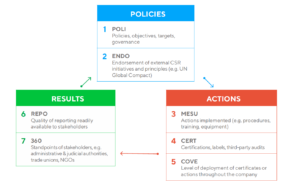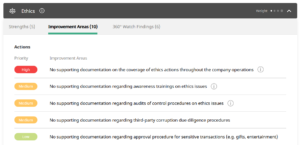Anti-corruption in the Ecovadis rating

EcoVadis is the lead provider of sustainability ratings, with more than 60,000 rated companies across its network. Companies are rated on their performance across 4 themes: Environment, Labor & Human Rights, Sustainable Procurement and finally Ethics, which covers Corruption issues.
Bettina Grabmayr is a Senior Sustainability Analyst at EcoVadis. She is responsible for the Ethics & Compliance theme of the EcoVadis rating methodology, which includes engaging stakeholders and aligning the methodology with emerging ethics & compliance best practices and issues.
-
How does EcoVadis address corruption in its rating?
The Ethics theme is an important part of the EcoVadis assessment. Its weight differs from one industry to another, but can have a weight as high as 30% in the rating for certain industries, such as financial services.
Corruption, along with Anticompetitive Practices and Information Security, is one of the key issues of the Ethics theme. Companies are rated on the quality of their anti-corruption management system, i.e. the Policies, Actions and Results they have put in place to address and prevent corruption risks.
In order to assess the robustness of this anti-corruption management system, the EcoVadis Methodology focuses on 7 management indicators:

Rated companies have to provide supporting documents on each of these indicators, and the documents are verified and analyzed by EcoVadis analysts. For instance, a company may declare having implemented certain best practices under the Measure indicator (e.g. corruption risk assessment, training of most exposed employees, whistleblower procedure, audit of internal controls), but it has to provide formal evidence from its management system for EcoVadis to credit this in the rating.
EcoVadis has a holistic approach to assessing a company’s efforts to prevent corruption: in order to achieve the best score, only adopting a Code of conduct (Policies) for instance is insufficient, as the company will also have to demonstrate it has put concrete actions in place to implement the Code of Conduct (Actions), and that it monitors and reports on its progress through KPIs (Results).
-
Do rated companies receive additional recognition if they are ISO 37001 certified
Certifications are an additional sign of robustness for a management system, as it has been audited and verified by a credible third party. This is why companies with certified management systems receive additional points under the Certification indicator.
On the topic of Corruption specifically, our database indicates that this remains a rare practice for companies however. For instance, in 2019, less than 1% of the 20,000 companies rated that year by EcoVadis had a certified anti-corruption management system. Companies’ reluctance to certify what ultimately remains human behavior is a possible explanation for the current low adoption of ISO 37001, but also of anti-corruption certification standards in general. It is however worth noting that ISO 37001 being a still relatively new standard, it will be interesting to observe how its adoption will evolve in the coming years.
-
Does EcoVadis only rely on evidence provided by the company to rate its anti-corruption performance?
On top of analyzing the supporting documents shared by the company itself, EcoVadis also runs what we call our 360° Watch to provide a complete picture of the company’s performance on corruption issues.
360° Watch Findings are information items discovered by our news scanning in the public domain and specialized compliance proprietary databases. The findings are then screened by our analysts first to ensure their relevancy, and second, to determine to which extent the case should impact the rated company’s score.
The 360° Watch is therefore a key component of the rating methodology, as it may reveal important controversies (e.g. corruption allegations or investigations, sanctions, fines) which can ultimately point to deficiencies in the company’s management system.
The 360° indicator has a significant weight in the rating, and can serve to revise the score of a company that may have a sophisticated anti-corruption program when it comes to policies and procedures, but still faces significant corruption issues. This may indicate that the anti-corruption program is not effective, for instance if existing policies are not well communicated or if exposed employees are not adequately trained.
-
How does EcoVadis measure the progress of a company year after year?
The EcoVadis scorecard also provides qualitative information on the company’s performance: it highlights the areas in which the company performs well (Strengths) and the areas in which the company still faces gaps (Improvement Areas). These Improvement Areas are ranked by priority level on the scorecard, which allows the rated company to quickly identify on which topics it should focus on for the next assessment (e.g. company does not report on its progress, or the implemented actions do not cover the entire corporate group).

In order to improve its score, the company will then have to provide evidence in the next assessment that it has remediated and addressed the management gaps.
Finally, findings from the 360° Watch remain an effective reality check to verify whether the company has managed to stay clear of corruption controversies.
